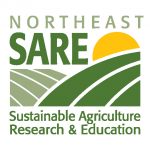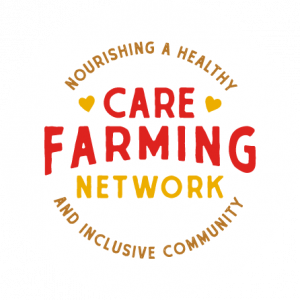Care Farming Network hosted three highly participatory Lunch & Learn webinars in March 2024. In honor of Developmental Disabilities Awareness Month, this series focused on Supporting Care Farmers with Intellectual & Developmental Disabilities.
Uncomfortable Confrontation: Simple De-Escalating Tips That Work
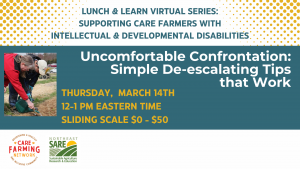
Though most of us would prefer to totally avoid confrontation, or any negative emotions or dysregulation, it is simply impossible to do. As a human being, there are times when we will be challenged with someone who is becoming frustrated or angry, possibly a friend or family member, or even someone at work. This can also be true of farm programs, whether it’s employees, volunteers, or participants in your farm program. The focus of this discussion was to provide simple de-escalating tips that will allow you to successfully support someone else who is exhibiting emotions that may be difficult to address while also providing easily remembered techniques to help co-regulate with others. This webinar is best suited for professionals working with people with intellectual & developmental disabilities.
Guest Speaker: Anna Schankowski, LMSW, is a Clinically Licensed Social Worker in Michigan. She has worked in public schools for almost 20 years, and also has experience with private therapy. Anna is a certified Trauma Informed Practices Trainer and Restorative Practices Train the Trainer. Founder and President of Healing Hearts Therapeutic Farm in Michigan, Anna has utilized so many of these clinical skills within her farm care program that provides healing to those struggling with emotional concerns, combined with Animal Assisted Interventions (Therapy, Education and Activities). Learn more about Healing Hearts Therapeutic Farm on their website.
Building Healthy Relationships At Work
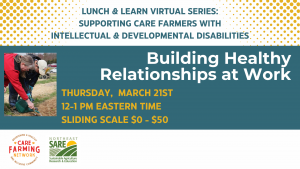
People with developmental disabilities are often left out of the conversation about sexuality and relationships, almost as if they are incapable of having thoughts, feelings, and needs. In reality, they, too, are sexual beings who need information and skills for making healthy decisions about sexuality. As someone who works in a competitive integrated employment setting or a worksite, you see the need to address relationships and sexuality on a one-on-one basis with people with I/DD who are employees. We explored the topics and main points to teach and examine techniques for helping people with I/DD to have healthy work relationships.
In this webinar participants:
- Gained knowledge about relationships and sexuality and specific issues for people with developmental disabilities.
- Explored knowledge and skills for building healthy relationships at work including types of relationships, public and private, and working with coworkers
- Explored ways to communicate about sexuality with people with developmental disabilities.
Guest Speaker: Katherine McLaughlin (M.Ed.)is certified as a sexuality educator by AASECT (American Association of Sexuality Educators, Counselors and Therapists) and is the Founder of Disability Workshops, now Elevatus Training, LLC. She is the CEO, Lead Trainer and delivers Elevatus’ live and online trainings. She is the author of Sexuality Education for People with Developmental Disabilities Curriculum and also develops educational materials for others to use in teaching and communicating. Learn more about Elevates Training on their website.
Adaptive Farming Strategies
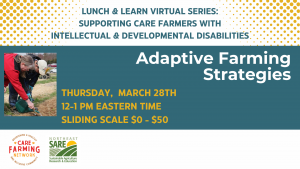
In this webinar, member care farms discussed the adaptive farm tools and techniques they use to operate neurodiverse-inclusive farms. Neurodiverse participation was encouraged! Presenters (with and without disabilities) shared their top techniques and tools they use in a production farm setting:
Red Wiggler Community Farm (Maryland) is a sustainable Care Farm where people with and without developmental disabilities come together to work, learn, and grow healthy food. Founded in 1996, Red Wiggler now serves over 1,900 community members, has a 120-share CSA program, distributes 50% of organic produce to low-income households through our Farm to Group Home and Farm to Food Bank programs, employs 15 adults with developmental disabilities, and regularly hosts field trips and volunteers. Learn more here: https://redwiggler.org/
Little Otter Flower Farm (Virginia) is a small family farm started for son Max who has Autism. A flower farm fits with the family’s love of being outdoors, their desire to be part of a community, and tasks that match Max’s strengths. Little Otter sells their flowers online as well as at a local farmers market, and they offer a “Random Act of Kindness” option through which anyone anywhere can purchase flowers as a gift to be locally delivered. Learn more here: https://littleotterflowerfarm.com/
Vertical Harvest (Wyoming) energizes local food systems via hydroponic, vertical, controlled environmental agriculture (CEA) to deliver healthier food and futures. We work with communities to develop underutilized space in urban, underserved neighborhoods, grow “up” on a fraction of the land required by traditional agriculture, while using 85% less water to deliver our produce at peak flavor and nutrition, year-round. We use an inclusive employment model currently focused on individuals with physical and/or intellectual disabilities. Learn more here: https://verticalharvestfarms.com/
Care Farming Network is grateful to Sustainable Agriculture Research and Education (SARE) for supporting this series!
